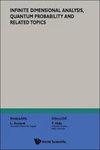关于状态对称量子马尔可夫半群发生器的导数作为平方根的存在性
IF 0.8
4区 数学
Q4 MATHEMATICS, APPLIED
Infinite Dimensional Analysis Quantum Probability and Related Topics
Pub Date : 2022-03-23
DOI:10.1142/s0219025723500030
引用次数: 2
摘要
Cipriani和Sauvageot已经证明,对于C*-代数$\mathcal{A}$上的迹对称量子马尔可夫半群的任何$L^2$ -生成器$L^{(2)}$,存在从$\mathcal{A}$到希尔伯特双模$H$的密定义导数$\delta$,使得$L^{(2)}=\delta^*\circ \overline{\delta}$。在这里,我们证明了导数的这种构造一般不能推广到关于非迹态对称的量子马尔可夫半群。特别地,我们证明了希尔伯特双模的所有导数都可以被假设为具有具体形式,然后我们用这种形式证明了在有限维情况下这种导数的存在性等价于线性方程组的正矩阵解的存在性。通过具体实例,利用Mathematica软件完成对这一线性方程组的求解证明。本文章由计算机程序翻译,如有差异,请以英文原文为准。
On the existence of derivations as square roots of generators of state-symmetric quantum Markov semigroups
Cipriani and Sauvageot have shown that for any $L^2$-generator $L^{(2)}$ of a tracially symmetric quantum Markov semigroup on a C*-algebra $\mathcal{A}$ there exists a densely defined derivation $\delta$ from $\mathcal{A}$ to a Hilbert bimodule $H$ such that $L^{(2)}=\delta^*\circ \overline{\delta}$. Here we show that this construction of a derivation can in general not be generalised to quantum Markov semigroups that are symmetric with respect to a non-tracial state. In particular we show that all derivations to Hilbert bimodules can be assumed to have a concrete form, and then we use this form to show that in the finite-dimensional case the existence of such a derivation is equivalent to the existence of a positive matrix solution of a system of linear equations. We solve this system of linear equations for concrete examples using Mathematica to complete the proof.
求助全文
通过发布文献求助,成功后即可免费获取论文全文。
去求助
来源期刊
CiteScore
1.50
自引率
11.10%
发文量
34
审稿时长
>12 weeks
期刊介绍:
In the past few years the fields of infinite dimensional analysis and quantum probability have undergone increasingly significant developments and have found many new applications, in particular, to classical probability and to different branches of physics. The number of first-class papers in these fields has grown at the same rate. This is currently the only journal which is devoted to these fields.
It constitutes an essential and central point of reference for the large number of mathematicians, mathematical physicists and other scientists who have been drawn into these areas. Both fields have strong interdisciplinary nature, with deep connection to, for example, classical probability, stochastic analysis, mathematical physics, operator algebras, irreversibility, ergodic theory and dynamical systems, quantum groups, classical and quantum stochastic geometry, quantum chaos, Dirichlet forms, harmonic analysis, quantum measurement, quantum computer, etc. The journal reflects this interdisciplinarity and welcomes high quality papers in all such related fields, particularly those which reveal connections with the main fields of this journal.

 求助内容:
求助内容: 应助结果提醒方式:
应助结果提醒方式:


